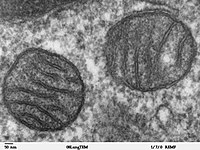
Photo from wikipedia
Tumor-derived lactic acid inhibits T and natural killer (NK) cell function and, thereby, tumor immunosurveillance. Here, we report that melanoma patients with high expression of glycolysis-related genes show a worse… Click to show full abstract
Tumor-derived lactic acid inhibits T and natural killer (NK) cell function and, thereby, tumor immunosurveillance. Here, we report that melanoma patients with high expression of glycolysis-related genes show a worse progression free survival upon anti-PD1 treatment. The non-steroidal anti-inflammatory drug (NSAID) diclofenac lowers lactate secretion of tumor cells and improves anti-PD1-induced T cell killing in vitro. Surprisingly, diclofenac, but not other NSAIDs, turns out to be a potent inhibitor of the lactate transporters monocarboxylate transporter 1 and 4 and diminishes lactate efflux. Notably, T cell activation, viability, and effector functions are preserved under diclofenac treatment and in a low glucose environment in vitro. Diclofenac, but not aspirin, delays tumor growth and improves the efficacy of checkpoint therapy in vivo. Moreover, genetic suppression of glycolysis in tumor cells strongly improves checkpoint therapy. These findings support the rationale for targeting glycolysis in patients with high glycolytic tumors together with checkpoint inhibitors in clinical trials.
Journal Title: Cell reports
Year Published: 2019
Link to full text (if available)
Share on Social Media: Sign Up to like & get
recommendations!